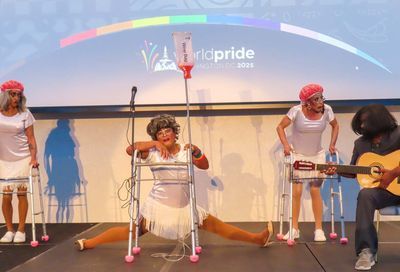HUD crafting rule to allow single-sex homeless shelters to turn away transgender people
Rule says individual shelters may set their own criteria for determining a person's sex, but standards must be applied equally

The U.S. Department of Housing and Urban Development is in the midst of crafting a new rule that would allow homeless shelters to be selective of whom they choose to house based on their gender identity.
Under the proposed rule, single-sex shelters would be allowed to accommodate only those individuals whose biological sex at birth matches their gender identity, and could turn away transgender individuals if they have a “good faith belief” that the person “is not of the sex, as defined in the single sex facility’s policy, which the facility accommodates.”
According to The Washington Post, which obtained a copy of the finalized rule — expected to be published in the Federal Register in the coming weeks — HUD plans to reverse the Obama administration’s 2016 guidance requiring homeless shelters to house transgender people based on the gender with which they identify.
The rule would keep in place a 2012 rule barring federal housing discrimination on the basis of sexual orientation or gender identity, but, in practice, the rule change may result in transgender people facing additional hurdles when searching for a shelter that will accommodate them.
Under the rule, which HUD officials have been working on since the spring of 2019, a person who is denied entrance to a shelter because of their gender identity must receive a transfer recommendation to another facility.
Shelter operators may choose to classify a person’s sex based on their self-identified gender. But the rule also requires shelter operators to be consistent in whether they use sex or gender identity to determine placements for transgender individuals.
The proposed rule says that HUD isn’t aware of data suggesting that transgender individuals pose a threat to cisgender women, but it says there is “anecdotal evidence that some women may fear that non-transgender, biological men may exploit the process of self-identification under the current rule in order to gain access to women’s shelters.”
The rule cites a lawsuit filed by the Hope Center, a faith-based women’s shelter in Anchorage, Alaska, which challenged a city ordinance that prohibits discrimination based on a person’s gender identity.
HUD also notes that a nine homeless women from Naomi’s House, a shelter in Fresno, Calif., signed on to a lawsuit against the shelter’s parent company after the shelter allowed an individual identifying as female to shower with them and allegedly sexually harass them. (Other transgender individuals who have lived at the shelter have questioned whether the individual in question is actually transgender.)

“HUD does not believe it is beneficial to institute a national policy that may force homeless women to sleep alongside and interact with men in intimate settings — even though those women may have just been beaten, raped, and sexually assaulted by a man the day before,” the rule reads.
But LGBTQ advocates, who have long opposed efforts by HUD — and, in particular, HUD Secretary Ben Carson — to give single-sex shelters leeway to refuse to house transgender individuals, have argued that those who are turned away may become discouraged and stop seeking out shelter due to fear of humiliation or harassment at the hands of their fellow shelter residents.
Carson has previously stated his opposition to allowing transgender females — whom he referred to as “men” — sharing spaces with their cisgender counterparts.
In a department meeting last September, he reportedly referred to transgender individuals as “big, hairy men” and argued against them being allowed to access female-designated facilities. Those comments led to condemnation from Democratic members of Congress, with U.S. Rep. Jennifer Wexton (D-Va.) calling for his resignation, and two other House Democrats introducing a resolution to censure him.
However, in light of Monday’s Supreme Court decision finding that anti-LGBTQ discrimination in employment constitutes sex discrimination, it is likely that proposals like the one touted by Carson may come under additional scrutiny.
Related: Ben Carson invokes trans shower panic to justify rollback of LGBTQ protections at HUD
Although the decision did not say anything about housing, Justice Samuel Alito, in his dissent, noted that the rationale used by the majority to reach their conclusion could be used to argue that discrimination against transgender individuals in housing is illegal under federal law.
A lawsuit cannot be filed until the finalized rule is published in the Federal Register, but LGBTQ advocates are already planning to sue should HUD move forward with its efforts to rescind the Obama-era guidance.
The National Center for Transgender Equality condemned the proposed rule in a statement.
“This proposal is yet another attack from the Trump administration on the safety of the most vulnerable members of our community. It flies in the face of Monday’s U.S. Supreme Court ruling, so it will not stand, but it could still put people in danger,” Mara Keisling, the executive director of the National Center for Transgender Equality, said.
“Discrimination and criminalization have left countless transgender people, particularly transgender people of color, exposed to violence and abuse, all while family rejection can leave transgender youth with nowhere to turn,” Keisling added. “Secretary Carson is contradicting the very mission of his department by trying to make shelters less safe for those who need them and further endangering the lives of marginalized people. We will fight this rule like trans lives depend on it because trans lives do depend on it.”
Support Metro Weekly’s Journalism
These are challenging times for news organizations. And yet it’s crucial we stay active and provide vital resources and information to both our local readers and the world. So won’t you please take a moment and consider supporting Metro Weekly with a membership? For as little as $5 a month, you can help ensure Metro Weekly magazine and MetroWeekly.com remain free, viable resources as we provide the best, most diverse, culturally-resonant LGBTQ coverage in both the D.C. region and around the world. Memberships come with exclusive perks and discounts, your own personal digital delivery of each week’s magazine (and an archive), access to our Member's Lounge when it launches this fall, and exclusive members-only items like Metro Weekly Membership Mugs and Tote Bags! Check out all our membership levels here and please join us today!

























You must be logged in to post a comment.